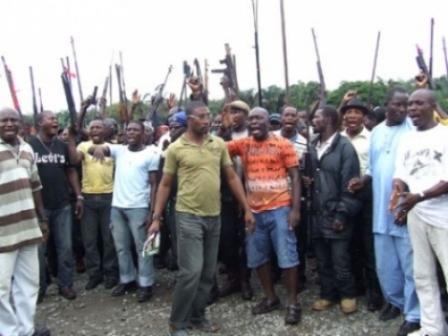More than 400 ex-militants today took to the streets of Yenagoa, capital of Bayelsa State, to protest against the new deal given to them in the third phase of an amnesty program with the federal government. The protesters smashed the windscreens of 10 cars and burnt one car during their demonstration. In addition, the former militants looted shops along Otiotio Road and Mbiama-Yenagoa Road in the Yenezuegene area of the state capital. SaharaReporters learnt that the protesters used a machete to cut an unidentified hawker in the back. Apprehensive businesses in the area hurriedly locked up for fear of being attacked by the ex-militants, eyewitnesses said.
The mayhem erupted around 9 a.m. and lasted for almost three hours, clogging up traffic in the state capital as residents scampered for safety.
Several of the protesters said they were dissatisfied with the proposed slots to be allocated to them under the new amnesty deal.
Last year, President Goodluck Jonathan had approved 3,642 ex-militants for training under the new amnesty program.
Some protesters told SaharaReporters that trouble began to brew when the Inter-Agency Taskforce headed by Air Vice Marshall Gbum told the ex-militants that they would be entitled to one amnesty training slot for every 15 guns handed over by a militant camp. The task force is currently on a verification exercise of ex-militants in the state.
It took the intervention of operatives of the Joint Taskforce (JTF), anti-riot policemen, officials of the State Security Service and the Nigerian Security and Civil Defense Corps to bring the tense situation under control.
The JTF’s spokesman, Lieutenant Colonel Onyema Nwachukwu, confirmed that the protest had been quelled, adding that the security outfit played no role in it.
In another reaction, Daniel Alabrah, a spokesman for the Presidential Amnesty Office, condemned the violent protest, noting that the ex-militants’ destruction of vehicles was uncalled for.
Mr. Alabrah clarified that the Amnesty Office had no hand in the allocation of slots to the ex-militants. He added that the Inter-Security Agency would only recommend a number of slots to them after its verification exercise.
A source said the taskforce was appointed by the Chief of Defense Staff to verify the quantity of weapons submitted by the former militants. Our efforts to reach the head of the Inter-Agency Security Taskforce were not successful as his mobile phone was not reachable.
In an interview, one of the ex-militant leaders, Tonye Bobo, rejected the proposal to offer one training slot per 15 guns turned in. He argued that all the ex-militants who surrendered arms to embrace amnesty should be given a slot in the amnesty program.
“The federal government should abide by the agreement reached between [the] late President Umaru Yar’Adua and the ex-militant leaders,” he said. He added: “The proposed 15 guns to one slot won’t be acceptable to us.”
Another ex-militant leader, known as Gen. Ebi John, expressed similar reservations about the controversial proposal on slots. He said there was the prospect of more mayhem unless the issue was satisfactorily resolved.
“We cannot condone this shabby treatment from the federal government after surrendering our arms and ammunitions to government to embrace the amnesty program,” he said.

